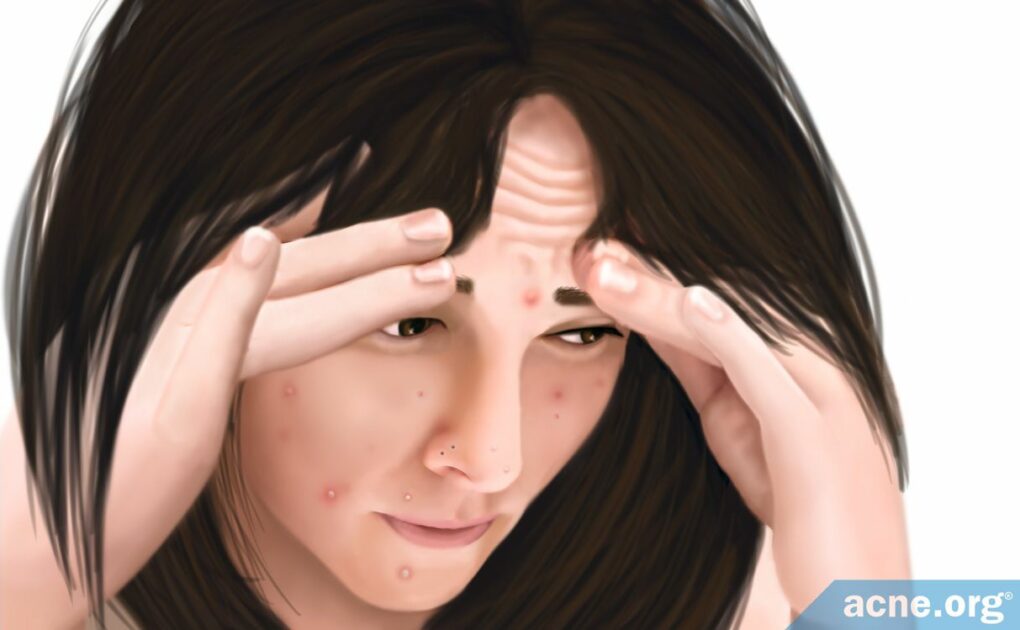Most Likely Yes, Since the Skin Appears to Be Sensitive to Stress

The Essential Info
Chronic stress results in the release of a cascade of chemicals in the body that may contribute to acne. Based on what we know about how these chemicals may lead to increased skin oil production and inflammation, it is likely that stress worsens acne.
Stress affects the entire body, but the skin is particularly sensitive to stress. If you feel stressed for a long period of time, it is wise to consider some lifestyle changes for the sake of your acne as well as your overall well-being. Exercising is the healthiest and most effective method of dealing with stress. Outdoor activities, meditation, and deep-breathing also are good techniques for reducing stress.

The Science
- The Body’s Response to Stress
- Acute Stress vs. Chronic Stress
- The Science
- Does Stress Cause Acne or Does Acne Cause Stress?
Research has proposed that psychological stress may be a factor in acne. There is little direct scientific evidence indicating what effect stress has on acne. However, based on what we know about how stress affects the skin, it is reasonable to suspect that stress may contribute to increased skin oil production and more inflammation in the skin, both of which are known to lead to more acne. Stress may also slow wound healing, and since acne lesions are wounds, ongoing stress has the potential to reduce the body’s capacity to heal acne as it should.
The Body’s Response to Stress
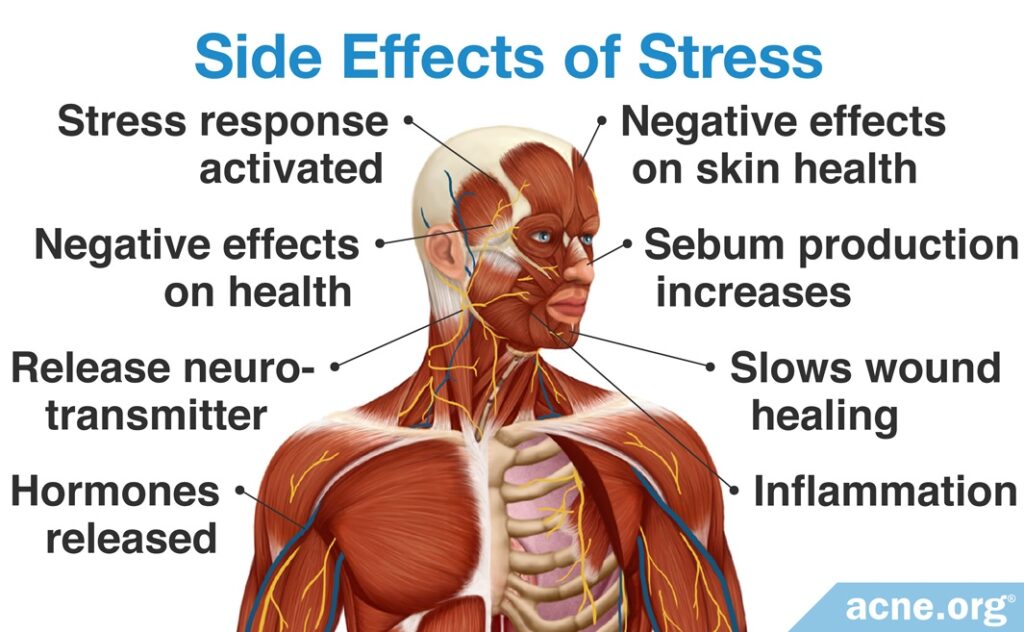
The body’s stress response is a normal and healthy phenomenon that evolved to help us survive. When stress occurs, the body responds by releasing chemicals called neurotransmitters as well as hormones that prepare the body to fight the perceived stress.
Neurotransmitters are molecules that enable communication between neurons (nervous system cells) and other neurons, between neurons and skin cells, and between neurons and the immune system.
The body also releases hormones, such as adrenaline, the classic “fight or flight” hormone, in times of stress.
However, the stress response is meant to be activated only periodically, in response to real dangerous situations. In today’s world, however, the stress response can go into overdrive, leading to chronic stress. Chronic stress results in continuous activation of the stress response, and this can negatively affect health, including skin health.
The skin is the body’s largest organ and has the ability to react to neurotransmitters and hormones. Since the stress response involves neurotransmitters and hormones, the skin readily reacts to stress.1-3
Acute Stress vs. Chronic Stress
Psychological stress can be:
- Acute – temporary
- Chronic – ongoing
Acute stress: Acute stress means once the stressor goes away, the body’s response calms down. Taking an exam is an example of acute stress: you are anxious before the exam, so your body mounts a stress response. Once the exam is over and you are no longer anxious about it, your body calms down. With acute stress, the body responds by releasing neurotransmitters and hormones that stimulate the body’s protective mechanisms.
Chronic stress: With chronic stress, the stress does not go away. An ongoing difficult job or school situation, or ongoing relationship issues are all examples of chronic stress. In these situations, the stressor remains for a long period of time and so does the body’s response to the stressor. The body continues to release stress-fighting chemicals, and the resulting continuous stimulation eventually overwhelms the body’s immune system and causes it to stop responding correctly, which can cause problems, such as an increase in skin oil production and inflammation. Acne is an inflammatory disease that is associated with increased skin oil levels, so anything which causes inflammation and/or increased skin oil production can theoretically aggravate acne.
The Science
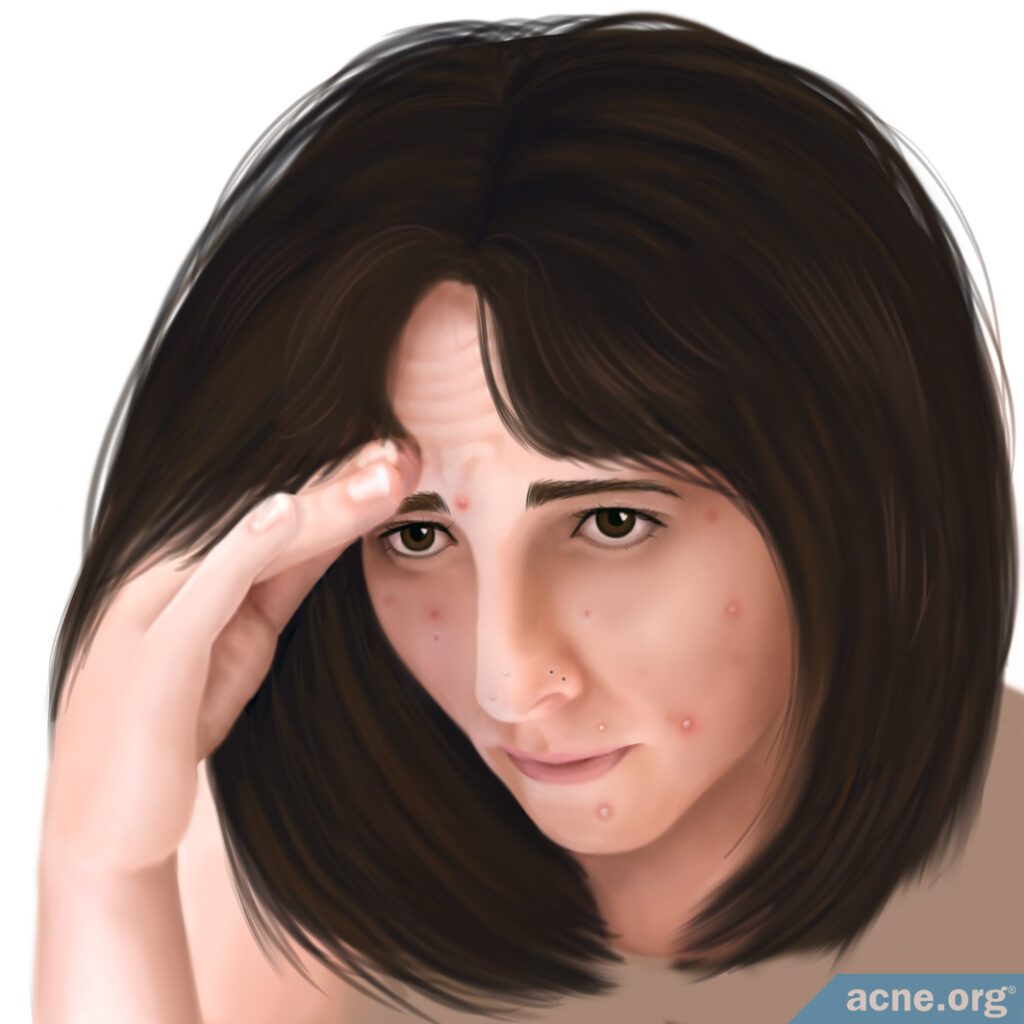
It is still unclear exactly how stress affects acne, but based on what we know about the impact of stress on the skin’s immune system, we can infer that chronic stress may cause an adverse effect on acne.1
A few studies have been performed so far:
- One study found that females in their 20s who experience more stress tend to suffer with worse acne when compared to females who are less stressed.2
- Another study found that for both males and females, using relaxation techniques to reduce stress may also help reduce acne.3
- Two studies found that stress tends to go hand-in-hand with acne symptoms in medical school students.4,5
Expand to read details of studies
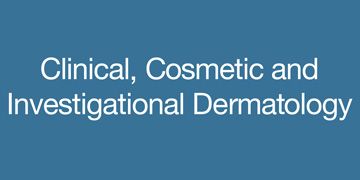
A study published in 2017 in the journal Clinical, Cosmetic and Investigational Dermatology looked for a connection between stress and acne severity. The researchers examined 144 female medical school students between the ages of 22 and 24 in Saudi Arabia. The scientists assessed each student’s acne and also gave her a questionnaire to determine her stress levels. The researchers concluded that stress tends to go hand-in-hand with more severe acne. They wrote, “The results indicated an increase in stress severity strongly correlated with an increase in acne severity.”2

A 2006 study in Dermatologic Therapy looked at the relationship between stress and acne by testing if stress management could improve acne. In this study, the researchers used the techniques of biofeedback, relaxation, and cognitive imagery to reduce stress in patients. The authors stated, “Patients who underwent treatment experienced significant improvement in acne as compared with controls. Interestingly, patients experienced recurrence of [blackheads and whiteheads] when relaxation techniques were discontinued. Longer-term utilization of stress management techniques may lead to improved acne control.”3 This study suggests not only that stress affects acne but also that reducing stress may improve it.

A 2017 study published in the International Journal of Current Medical And Applied Sciences looked for a connection between stress and acne in medical school students in India. Out of 500 students, 200 reported feeling stressed out, and about three-quarters (72%) of those who reported stress had pimples. The researchers wrote, “This study suggested a significant association between stress and acne.”4

Finally, a 2022 study published in the International Journal of Environmental Research and Public Health also found that academic stress among medical school students went hand-in-hand with acne symptoms. Interestingly, the researchers saw an even stronger connection between stress and symptoms other than acne, such as increased appetite, trouble concentrating, sleep changes, depression, and anxiety.5 This suggests the possibility that rather than causing acne directly, stress might first cause other health problems, which then trigger acne. More research is necessary to reveal exactly how stress might lead to more acne.
Stress-related Neurotransmitters and Hormones Linked to Increased Skin Oil Production and Inflammation
Exactly which chemicals released by the body in response to stress may end up increasing sebum (skin oil) production, and thus worsening acne, remains a subject of study. For example, some neurotransmitters, such as substance P, may increase sebum production. Hormones released in response to stress, such as androgens (male hormones that are present in both males and females), corticotropin-releasing hormone, and α-melanocyte-stimulating hormone may also increase sebum production, and in turn aggravate acne.8
Neurotransmitters: Three studies have looked at the neutrotransmitter called substance P in acne sufferers. All the studies found evidence that people with acne tend to have more substance P near skin oil glands or in their blood, which may lead to increased skin oil production, and potentially more acne. In other words, stress might cause an increase in substance P, which may then lead to more skin oil and more acne. But the second study suggests that the process might work the other way around, too: maybe having acne causes stress, which may lead to an increase in substance P. In other words, although people with acne tend to have more substance P, this does not necessarily mean that stress causes acne.7-9
Expand to read details of studies

A 2002 study in Experimental Dermatology tried to determine how the chemicals released by the nervous system might affect acne by looking at nerve fibers in the skin of acne patients. This study found that acne patients had more nerves that release substance P in close proximity to sebaceous glands (skin oil glands), than people who didn’t have acne. Substance P increases the expression of a molecule called neutral endopeptidase, which leads to an increase in sebum production.7

Similarly, a 2003 clinical study in Archives of Dermatology found that acne patients had an increased concentration of neurotransmitters, especially substance P, in sebaceous glands. However, the authors of this study cautioned that the relationship between substance P and sebaceous glands was only a correlation and that it did not indicate cause and effect. The authors noted that, since having acne can be stressful, an increased concentration of stress-related molecules in the sebaceous glands could also be a consequence of acne rather than a cause.8

Finally, a 2021 study published in the International Journal of General Medicine also found a connection between stress and substance P levels in people with acne. The researchers looked at 30 people in their twenties with acne and 30 people of the same age without acne. Among the people with acne, those who reported higher levels of stress tended to have higher levels of substance P in their blood. For people without acne, there didn’t seem to be a pattern between their reported stress and their substance P levels. Thus, the researchers concluded that in people with acne, stress and substance P are somehow linked, but exactly how is yet to be determined.9
Hormones: Androgens, corticotropin-releasing hormones, and α-melanocyte-stimulating hormones are important hormones that the body releases as part of the stress response. Research has found that people who have acne have higher levels of these hormones than people who do not have acne. Androgens and corticotropin-releasing hormones can result in increased sebum production, and α-melanocyte-stimulating hormone can result in skin inflammation.10,11
Conflicting Studies on Stress and Sebum Production
Some researchers propose that sebum might provide the link between stress and acne since most studies so far have shown that neurotransmitters released in response to stress affect sebaceous glands. Sebaceous glands have receptors for neurotransmitters, and activation of these receptors leads to increased sebum production as well as inflammation. In other words, as suggested in one 2004 study, stress may trigger neurotransmitter release, which in turn may lead to more sebum and more acne.12
Expand to read details of study

According to a 2004 study in Experimental Dermatology, “[t]here is increasing evidence to suggest that the nervous system (such as emotional stress) can influence the course of acne. Cutaneous neurogenic factors may contribute to the onset and⁄or exacerbation of acne inflammation. The current findings […] indicate that [stress] may, indeed, influence the feedback regulation in the sebaceous gland, thus inducing the development of clinical inflammation in early acne lesions.”12
In contrast, another study found no relationship between stress and sebum levels, despite agreeing that stress seems to be correlated with more severe acne.13
Expand to read details of study

A small 2007 study in Acta Dermato-Venereologica that looked at the relationship between stress, sebum production, and acne in adolescents found no relationship between stress and sebum levels. However, this study did find a positive correlation between stress and acne severity. The authors concluded, “In adolescents, psychological stress does not appear to affect the quantity of sebum production. The study suggests a significant association between stress and severity of [inflammatory acne], especially in males. Increased acne severity associated with stress may result from factors other than sebum quantity.”13
In other words, while researchers agree that stress tends to go along with more acne, we do not know whether this is because stress increases sebum levels and therefore causes acne to worsen.
Does Stress Cause Acne or Does Acne Cause Stress?
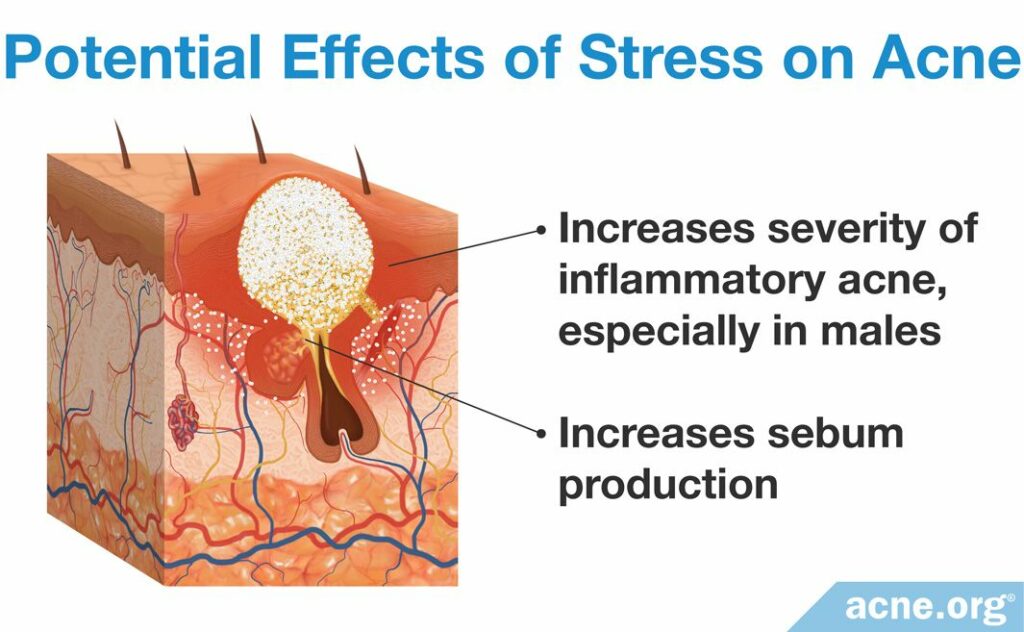
While we do not know for sure whether stress causes acne or not, we do know that the reverse can be true: acne can cause psychological stress.

According to a 2011 article in Gut Pathogens, “[a]cne vulgaris is a common dermatological disorder frequently associated with depression, anxiety and other psychological [issues]. The mental health impairment scores among acne patients are higher vs. a number of other chronic, non-psychiatric medical conditions, including epilepsy and diabetes.”6
From what we can tell, stress most likely does make acne worse. But, worrying about stress is of course counterproductive and will just cause more stress. The best bet is to exercise, get outside, and try meditation or deep breathing to handle your stress a bit better.
References
- Rodriguez-Vallecillo, E. & Woodbury-Farina, M. A. Dermatological manifestations of stress in normal and psychiatric populations. Psychiatr. Clin. North. Am. 37, 625 – 651 (2014). https://www.ncbi.nlm.nih.gov/pubmed/25455069
- Zari, S. & Alrahmani, D. The association between stress and acne among female medical students in Jeddah, Saudi Arabia. Clin. Cosmet. Investig. Dermatol. 10, 503-506 (2017). https://www.ncbi.nlm.nih.gov/pmc/articles/PMC5722010/
- Fried, R. G. & Wechsler, A. Psychological problems in the acne patient. Dermatol. Ther. 19, 237 – 240 (2006). https://www.ncbi.nlm.nih.gov/pubmed/17004999
- Simi, P. S., Philip, M., Felicita, J., Ebenezer, S., & Joseph, P. T. A study on the association between acne vulgaris and stress among medical students. International Journal of Current Medical and Applied Sciences 16,129-131 (2017). https://www.ijcmaas.com/images/archieve/IJCMAAS_NOV_2017_VOL16_ISS3_03.pdf
- Aziz, F. & Khan, M. F. Association of academic stress, acne symptoms and other physical symptoms in medical students of King Khalid University. Int. J. Environ. Res. Public Health 19, 8725-8732 (2022). https:pubmed.ncbi.nlm.nih.gov/35886577/
- Bowe, W. P. & Logan, A. C. Acne vulgaris, probiotics and the gut-brain-skin axis – back to the future? Gut. Pathog. 3, 1 (2011). https://www.ncbi.nlm.nih.gov/pubmed/21281494
- Toyoda, M., Nakamura, M., Makino, T., Kagoura, M. & Morohashi, M. Sebaceous glands in acne patients express high levels of neutral endopeptidase. Exp. Dermatol. 11, 241 – 247 (2002). https://www.ncbi.nlm.nih.gov/pubmed/12102663
- Chiu, A., Chon, S. Y. & Kimball, A. B. The response of skin disease to stress: changes in the severity of acne vulgaris as affected by examination stress. Arch. Dermatol. 139, 897 – 900 (2003). https://www.ncbi.nlm.nih.gov/pubmed/12873885
- Jusuf, N. K., Putra, I. B. & Sutrisno, A. R. Correlation between stress scale and serum substance P level in acne vulgaris. Int. J. Gen. Med. 14, 681-686 (2021). https://pubmed.ncbi.nlm.nih.gov/33688239/
- Ganceviciene, R., Bohm, M., Fimmel, S. & Zouboulis, C. C. The role of neuropeptides in the multifactorial pathogenesis of acne vulgaris. Dermatoendocrinol. 1, 170 – 176 (2009). https://www.ncbi.nlm.nih.gov/pubmed/20436885
- Lotti, T., Bianchi, B., Ghersetich, I., Brazzini, B. & Hercogova, J. Can the brain inhibit inflammation generated in the skin? The lesson of α-melanocyte-stimulating hormone. Int. J. Dermatol. 41, 311 – 318 (2002). https://onlinelibrary.wiley.com/doi/abs/10.1111/j.1365-4632.2002.01408.x
- Zouboulis, C. C. & Bohm, M. Neuroendocrine regulation of sebocytes — a pathogenetic link between stress and acne. Exp. Dermatol. 13 Suppl 4, 31 – 35 (2004). https://www.ncbi.nlm.nih.gov/pubmed/15507110
- Yosipovitch, G. et al. Study of psychological stress, sebum production and acne vulgaris in adolescents. Acta. Derm. Venereol. 87, 135 – 139 (2007). https://www.ncbi.nlm.nih.gov/pubmed/17340019
 Acne.org Products
Acne.org Products